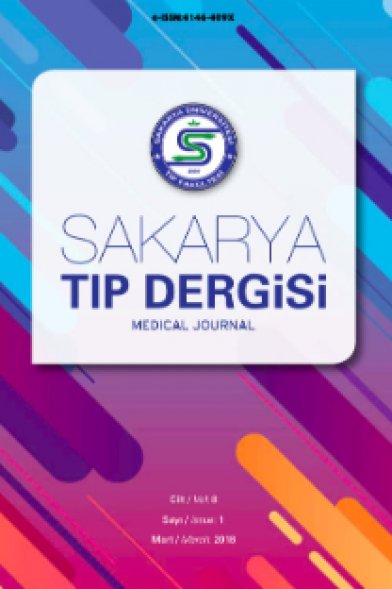Recovering Fetuses from Syphilis: Antenatal Care, Maternal, and Neonatal Outcomes
Non-treponemal test, Treponemal test, Syphilis, syphilis in pregnancy, Penicillin benzathine G
Fetüslerin Sifilizden Zarar Görmemesi: Antenatal Bakım, Maternal ve Neonatal Sonuçlar
___
- 1. Qin J, Yang T, Xiao S, Tan H, Feng T, Fu H. Reported estimates of adverse pregnancy outcomes among women with and without syphilis: a systematic review and meta-analysis. PLoS One2014;9(7).
- 2. Prevention CfDCa. Sexually Transmitted Disease Surveillance 2017. 2018.
- 3. Schmid GP, Stoner BP, Hawkes S, Broutet N. The need and plan for global elimination of congenital syphilis. Sexually transmitted diseases2007;34(7):5-10.
- 4. Prevention ECfD, Control. Annual Epidemiological Report: ECDC, European Centre for Disease Prevention and Control2012.
- 5. Organization WH. WHO guideline on syphilis screening and treatment for pregnant women: World Health Organization2017.
- 6. Aktas G. Serological Diagnosis of Syphilis. Turk Mikrobiyol Cem Derg2005;35(1):6.
- 7. Alexander JM, Sheffield JS, Sanchez PJ, Mayfield J, Wendel GD, Jr. Efficacy of treatment for syphilis in pregnancy. Obstetrics and gynecology1999;93(1):5-8.
- 8. Republic of Turkey MoH. Syphilis statistics, The distribution of syphilis cases by year. 2020.
- 9. Durusoy R, Karababa AO. Completeness of hepatitis, brucellosis, syphilis, measles and HIV/AIDS surveillance in Izmir, Turkey. BMC Public Health2010;10(1):71.
- 10. Kahn JG, Jiwani A, Gomez GB, Hawkes SJ, Chesson HW, Broutet N, et al. The cost and cost-effectiveness of scaling up screening and treatment of syphilis in pregnancy: a model. PLoS One2014;9(1).
- 11. Bristow CC, Larson E, Anderson LJ, Klausner JD. Cost-effectiveness of HIV and syphilis antenatal screening: a modelling study. Sex Transm Infect2016;92(5):340-346.
- 12. Gomez GB, Kamb ML, Newman LM, Mark J, Broutet N, Hawkes SJ. Untreated maternal syphilis and adverse outcomes of pregnancy: a systematic review and meta-analysis. Bulletin of the World Health Organization2013;91:217-226.
- 13. Liu H, Chen N, Yu J, Tang W, He J, Xiao H, et al. Syphilis-attributable adverse pregnancy outcomes in China: a retrospective cohort analysis of 1187 pregnant women with different syphilis treatment. BMC infectious diseases2019;19(1):292.
- 14. Torres RG, Mendonça ALN, Montes GC, Manzan JJ, Ribeiro JU, Paschoini MC. Syphilis in pregnancy: the reality in a public hospital. Revista Brasileira de Ginecologia e Obstetrícia/RBGO Gynecology and Obstetrics2019;41(02):90-96.
- 15. De Santis M, De Luca C, Mappa I, Spagnuolo T, Licameli A, Straface G, et al. Syphilis infection during pregnancy: fetal risks and clinical management. Infectious diseases in obstetrics and gynecology 2012;4:(3):5-8
- 16. Vashisht D, Baveja S. Eponyms in syphilis. Indian journal of sexually transmitted diseases and AIDS2015;36(2):226.
- 17. Fiumara NJ. Syphilis in newborn children. Clinical obstetrics and gynecology1975;18(1):183-9.
- 18. Rac MW, Bryant SN, McIntire DD, Cantey JB, Twickler DM, Wendel Jr GD, et al. Progression of ultrasound findings of fetal syphilis after maternal treatment. American journal of obstetrics and gynecology2014;211(4):426.
- 19. Fuchs F, Michaux K, Rousseau C, Ovetchkine P, Audibert F. Syphilis infection: an uncommon etiology of infectious nonimmune fetal hydrops with anemia. Fetal diagnosis and therapy2016;39(1):74-7.
- 20. Wendel Jr GD, Sheffield JS, Hollier LM, Hill JB, Ramsey PS, Sánchez PJ. Treatment of syphilis in pregnancy and prevention of congenital syphilis. Clinical Infectious Diseases2002;35(2):200-209.
- 21. Alexander JM, Sheffield JS, Sanchez PJ, Mayfield J, Wendel Jr GD. Efficacy of treatment for syphilis in pregnancy. Obstetrics & Gynecology1999;93(1):5-8.
- 22. Workowski KA, Berman SM. CDC sexually transmitted diseases treatment guidelines. Clinical Infectious Diseases2002;35(2):135-137.
- 23. Workowski KA. Centers for Disease Control and Prevention sexually transmitted diseases treatment guidelines. Clinical Infectious Diseases2015;61(8):759-762.
- 24. Myles TD, Elam G, Park-Hwang E, Nguyen T. The Jarisch-Herxheimer reaction and fetal monitoring changes in pregnant women treated for syphilis. Obstetrics and gynecology1998;92(5):859-864.
- 25. Rac MW, Revell PA, Eppes CS. Syphilis during pregnancy: a preventable threat to maternal-fetal health. Am J Obstet Gynecol2017;216(4):352-363.
- 26. Yang T, Tong M, Xi Y, Guo X, Chen Y, Zhang Y, et al. Association between neurosyphilis and diabetes mellitus: Resurgence of an old problem Journal of diabetes2014;6(5):403-408.
- 27. Janier á, Hegyi V, Dupin N, Unemo M, Tiplica G, Potočnik M, et al. 2014 European guideline on the management of syphilis. Journal of the European Academy of Dermatology and Venereology2014;28(12):1581-1593.
- 28. Republic of Turkey MoH. Syphilis Surveillance In: Directorate PHG, editor. Infectious Diseases Department2020.
- Yayın Aralığı: 4
- Başlangıç: 2011
- Yayıncı: Sakarya Üniversitesi
Aile Hekimlerinin Covıd-19 Pandemi Döneminde Kişisel Koruyucu Önlem Alma Davranışları
Hüseyin ÜÇER, Erhan KAYA, Ayşegül ERDOĞAN
Özgür ŞENOL, Emine DAĞISTAN, Zeliha COŞGUN, Melike KALFAOGLU, Yasar DAGİSTAN
Bahattin ÖZKUL, Fatih YENİHAYAT, Furkan URFALI, Nurşen YÜKSEL, Arzu ARSLAN
6-18 Yaş Grubu Çocuklarda İnternet Bağımlılığının ve İlişkili Faktörlerin İncelenmesi
Gamze ÇAN, Selim GÜNÜÇ, Murat TOPBAŞ, Nazım Ercüment BEYHUN, Kübra ŞAHİN, Büşra PARLAK SOMUNCU
Bir Üniversite Hastanesindeki Sağlık Çalışanlarında Ramazan Orucunun Ruh Sağlığı Üzerine Etkileri
Fatma KARTAL, Sümeyye DEMİRBAY, Burak METE, Cemal ÖZCAN, Süheyla ÜNAL
Hiperemezis Gravidarumun Maternal Anksiyete ve Depresyon Düzeyleri ile İlişkisi
Haççe YENİÇERİ, Mehmet Murat IŞIKALAN, Ali ACAR
Aşılamaya Yönelik Tutum ve Davranışı Etkileyen Faktörler
Oğuz KARABAY, Yasemin YİĞİT, Ebru AYDIN, Fatma TOK, İrem KARACA, Buşra BOZ, Gökhan OTURAK
Koroner Arter Perforasyonu Gelişiminde Nötrofil-Lenfosit Oranının Rolü
